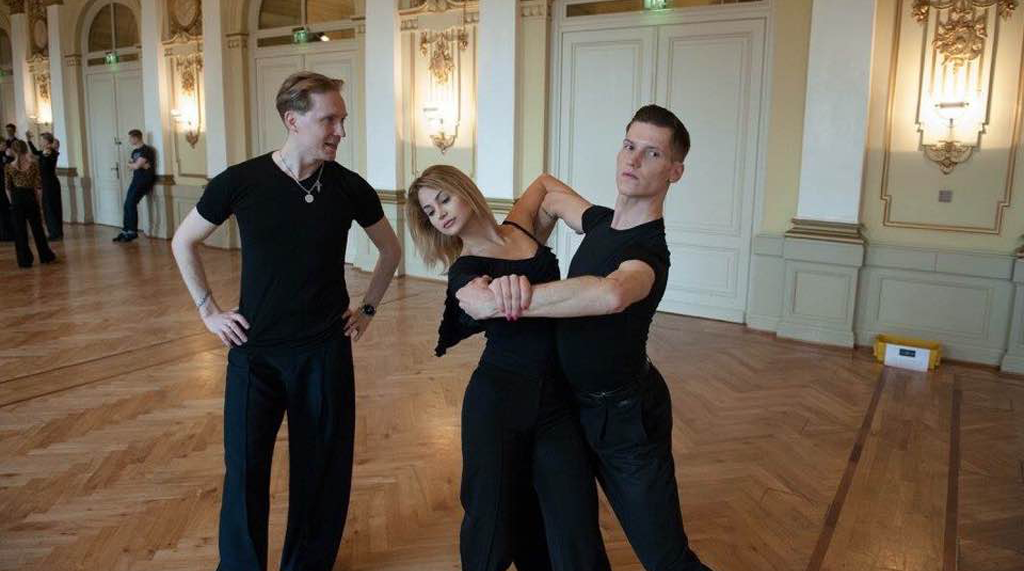I started to dance at the age of 7 because I had some problems with my spine. Clearly, I didn’t want to go to dance classes, I thought that “Dancing is not cool”. But, after I won a few competitions, I started to enjoy competitive dancing. From that point on, dancing became the coolest thing ever.
I continued my competitive dancing career up to the age of 24. When I was younger I thought that I’d retire no sooner than 32, but, that happened much earlier, due to my partner’s health problem. Namely, when I was 23, my last partner (my actual wife) had to go through a knee operation. As destiny would have it, after the operation, doctors said she had to stop dancing. That was the moment when I also decided to stop dancing.
After all, the years when I was dancing with my last partner (my wife) were the most successful ones in my entire career. We got the 2nd and 3rd place at Blackpool Under 21 and we won several International Under 21 Championships.
When I decided to retire at the age of 24, it didn’t even cross my mind to give up on dancing. In fact, ending my competitive dancing career was actually the beginning of my dance teaching career. I wanted to prove everyone that I’m still in the game and that I can achieve great things as a dance teacher as well.
What Does It Mean To Be A Good and Caring Dance Teacher?
Teaching requires not only teaching students technique and steps but also being engaged with them. For example, you can be the best dancer in the world, but if you don’t have the right approach and attitude towards your students, you probably won’t be a good dance teacher.
What your students need from you is support, compassion, and knowledge. In other words, a good teacher knows the boundary between “friendly” and “professional”. You should be friendly and understanding, but at the same time, you have to be strict enough and create a working atmosphere where dancers can develop themselves both as people and dancers.
I have to admit that I learned all this from my dance teacher Caterina Arzenton. I was so lucky to have her by my side in the last 4 years of my competitive dancing career because we did amazing things together. Not only did she motivate me to give my best, but she also pushed me to achieve my goals. What I learned through my relationship with my dance teacher, and with my students were the next things:
1. Trust is the foundation
The most important thing for a dancer is to have a teacher whom he/she can trust 100%. Of course, this cannot be achieved overnight. In fact, developing trust takes time, but it will eventually happen if you stick to your principles. Remember you’re a teacher – you dictate the rules and dancers count on you. Meaning you should help them to improve their skills, to strengthen their bond as a couple, and to build a strong mindset.
If you’re open-hearted, supportive, and strict, you won’t have problems with creating a healthy and strong communication with your dancers.
2. Be always there for your dancers
Another thing I learned during my dancing and teaching career is that a teacher should be there for dancers.
Back in the days when I was competing, I remember my dance teacher was there to support me every step of the way and help me go through those big, important moments in my life. And it meant the world to me. I felt more secure and confident when I saw my teacher standing there, believing in us. That’s why I follow my couples to competitions; I know how much they need me there.
3. Don’t give up on your dancers
It’s easy to motivate your couples when everything’s going great – they’re seeing progress, their results are great. But, what happens when your dancers fail and lose competitions? What happens when they work so hard and they don’t see any progress? What happens when they are tired, ready to give up? Will you give up on them too?
It’s not enough to be there for your dancers when things are going great. It’s more important that you’re there for them during tough times, when very few people stay by their side motivating them to look up and move forward.
When Madis and Aleksandra had bad results and lost the World Championship in Youth, I was truly present for them, and we cried together. The next day, my dancers were ready to train harder and their motivation was stronger than ever before. They believed in dancing and so did I.
4. Help them build a strong mindset
In the world of dancesport, failure is inevitable. Your couples can train very hard, and invest everything they have in dancing, and still not become champions. Because of that, it’s crucial that they learn to accept what they cannot change and focus on what they can change.
Your role as a teacher is analyzing the strengths and weaknesses of your dancers since they constantly need improvement.
Sometimes, when I was competing and I thought I was doing great, I actually got bad results. On the other hand, there were moments when my teacher told me that it was a disaster, yet we won a competition. Either way, I always trusted my teacher, and she always believed in us.
5. It’s not all about the teacher
The last thing that I learned during my teacher’s career is that is not all about you. Sure, you should be there for your dancers. However, you can’t do it all by yourself. And, you shouldn’t. You’re a dance teacher, for God’s Sake, you’re not a God. You can’t be a therapist, a nutritionist, a mother, and a father. There have to be limits, if you want to keep your sanity.
Besides, your dancers should have other people in their life who would help them and support them, like you do. Those people should be their friends and family, as well as other professionals.
Dancers will come across different problems in their careers, and more often than not, they will need professional help. For example, some dancers need to lose weight, others need to change their diet, while some feel anxious and insecure at the competition. Clearly, you can’t deal with all that because you don’t know everything. And that’s totally fine.
The best thing you can do to help them (and yourself) is to find a professional. Then they will help them deal with the problem and solve it.
Understanding The Basics – The Key To Successful Teaching
Every teacher has its own teaching strategy and technique. So, you’ll develop yours over years, by experimenting with different ways of teaching.
As for my teaching strategy, I firmly believe in the basics and teaching the technique of the dance.
1. Mastering the Basics
Clearly, the way we dance now is very different than the way dancers danced 10, 20 years ago. The rules in the dancesport world are changing fast, and we have to adjust to them. But, even though the rules are changing fast, the base is still the same – it’s all about moving your feet and your body. That’s exactly why I think dancers should know the history of the dance and master the basics. I was lucky to have teachers from the UK that knew a lot about the basics and how it was done before. I also had lessons with Bill Irvine where I learned what’s behind the steps.
As you probably already know, you have the basic steps in every dance – the Rumba, the Tango, the Samba, etc. And while you may learn and memorize all the steps, if you want to be a professional dancer, you have to dig deeper and discover what it means to make those basic steps. You have to understand the way you move your feet, your knees, your hips; your whole body. When you capture the knowledge behind that, you have a strong foundation for upgrading your skills, style, and technique.
In order to move forward with the dance, you first have to understand the history.
2. Go one step further
When the dancers are ready to move forward, because they mastered the basics (I speak of top dancers), then you can teach them musicality, and focus more on the choreography. I work with my top dancers on feeling the music more. My main goal with them is to create the right atmosphere through dance so that the audience is dazzled by the couple’s performance.
3. Practise, practise, practise
Also, when I’m working with couples, I have private lessons with them whenever I am in Estonia. When I have lessons with Madis, I keep an eye on them, so that they don’t relax. They need to have that feeling of someone’s watching what they’re doing, so they work the best they can.
4. Teach systematically
I always give a feedback to my couples, so they know what to focus on more, and what’s already good enough.
In addition, I don’t just throw information at them; I teach them systematically, step by step. That way, the couples will learn the lesson while understanding it, and much faster.
5. Strive to improve
Being a teacher means that you constantly strive towards excellence and improvement, trying new approaches and analyzing in order to take your teaching to the next level. That being said, I make sure that I analyze my couples and their competitors, recognizing their weaknesses and strengths.
One more thing that you can do to improve your teaching is to educate yourself. Don’t think that you’re the best and that you don’t have anything else to learn because you do. Instead, attend the lectures of other teachers, or watch various YouTube channels.
Give your students the best of you – compassion, understanding, knowledge, and your time. Nothing beats the feeling that a caring teacher leaves on their students. Teaching is so much more than teaching your dancers steps and technique, so unlock your creativity and believe in yourself. That’s what makes a good teacher. I wish you all the best, and hope that you enjoy teaching as much as I do. Just like dancing, teaching is also a way of life. And what better way to have it all, than to combine these two?
You can listen to Makarov on our Dancesport Life Show Podcast. Have a great listen!

